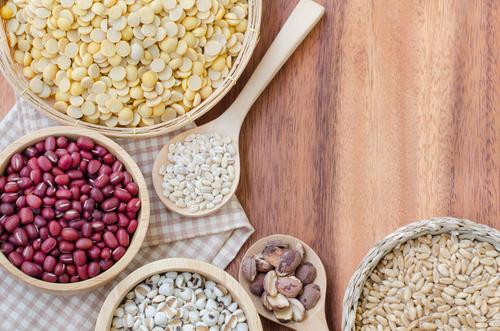Breast cancer patients taking Ibrance (palbociclib) plus Femara (letrozole), an approved combination for the disease, should avoid diets rich in estrogen-like compounds, researchers say.
Their research shows that these compounds, called xenoestrogens, can largely hamper the effectiveness of the medicines, even if present in just small amounts.
The investigators tested the effects of two compounds — genistein and zearalenone — found in soybeans, maize, barley, wheat, and other grains, but believe this is just the tip of the iceberg, and many other xenoestrogens may have similar effects.
“Breast cancer patients taking palbociclib/letrozole should consider limiting their exposure to foods that contain xenoestrogens,” Gary Siuzdak, PhD, senior director of the Center for Metabolomics of The Scripps Research Institute (TSRI), said in a news release.
The study, “Metabolomics Reveals that Dietary Xenoestrogens Alter Cellular Metabolism Induced by Palbociclib/Letrozole Combination Cancer Therapy,” was published in the journal Cell Chemical Biology.
The combination of Ibrance and Femara received accelerated approval from the U.S. Food and Drug Administration in February 2015, and the FDA is currently reviewing the combination as a standard first-line treatment for postmenopausal women with ER-positive, HER2-negative metastatic breast cancer.
While Femara prevents estrogen production, Ibrance inhibits cancer cells from dividing, a combination that doubled the time to disease progression in postmenopausal women with ER-positive breast cancers.
The combination is now used as standard of care for these women, but the “underlying metabolic effects of these drugs are yet unknown,” researchers explained.
The team at the The Scripps Research Institute set out to investigate the metabolites (products of the metabolism) produced by breast cancer cells in the presence of such medicines.
“By profiling cell metabolomes with and without drug treatment we can get very useful information, for example about the biological pathways perturbed by the drug,” said Siuzdak, a professor of chemistry and molecular and computational biology.
While none of the drugs had major effects when used alone, their combination significantly prevented several essential cellular mechanisms.
“The combination had a much more pronounced effect on cell-growth-related metabolites, which is consistent with the clinical trial results,” said first and lead author Benedikt Warth, PhD.
Dietary consumption of plant-derived estrogen-like compounds has become a concern when treating ER-positive breast cancers. The so-called “natural” alternatives to hormone replacement therapy, such as genistein and zearalenone, can actively bind to the estrogen receptor and trigger its pro-proliferative and pro-survival effects, supporting breast cancer progression.
Zearalenone can be found in maize, barley, wheat, and other grains, while Genistein is produced in certain plants, including soybeans, and is often highly concentrated in phytoestrogen-rich food supplements.
To address whether these compounds had an effect on the anti-cancer properties of Ibrance and Femara, researchers treated breast cancer cells in the presence of genistein or zearalenone.
The compounds, even in low doses, reversed many of the effects ;of the therapies, and cells resumed proliferating at a rate comparable to that seen in the absence of the drugs.
Genistein and zearalenone are just two of a large family of xenoestrogens that can be found in the human diet, researchers caution. “There’s a high likelihood that other xenoestrogens would counteract the therapy in a similar way,” Siuzdak said.
“We generally know very little about the interactions of bioactive compounds we are exposed to through our food or the environment with drug treatments,” said Warth, now an assistant professor at the University of Vienna in Austria. “So, in this field there are probably a lot of clinically relevant discoveries yet to be made.”

